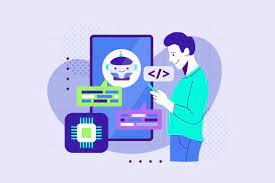The success of modern businesses now focuses on the customer experience. In a world where convenience, speed, and personalization define brand loyalty, conventional customer service techniques are no longer sufficient. Developers of AI chatbots are revolutionizing this field. They are changing the way that businesses, ranging from retail and healthcare to banking and travel, interact with their clientele by creating and developing intelligent conversational agents.
In this blog, we’ll explore how AI chatbot developers are revolutionizing customer experience, the industry’s leading adoption, and what the future holds for businesses embracing chatbot technology.
1. The Role of AI Chatbot Developers in Today’s Market
To build bots that understand, react, and adjust to human interactions, AI chatbot developers combine artificial intelligence, natural language processing (NLP), and user experience design. They are innovators rather than merely programmers.
Key contributions of AI chatbot developers:
- Designing conversational flows that mimic human interaction.
- Implementing NLP and machine learning for smarter responses.
- Integrating chatbots into business systems (CRM, ERP, e-commerce platforms).
- Ensuring scalability, multilingual support, and 24/7 availability.
- Personalizing chatbot behavior to match brand tone and customer needs.
By doing this, chatbot developers help companies deliver faster, more efficient, and customer-centric services that build trust and loyalty.
2. Why Businesses Are Turning to AI Chatbots
The increasing need for improved customer experiences is driving the push for AI chatbots. Businesses are realizing the benefits of automated assistants, and over 70% of consumers favor brands that provide fast digital interactions, according to industry surveys.
Benefits of driving chatbot adoption:
- 24/7 availability: Customers can interact anytime, anywhere.
- Cost efficiency: Reduces reliance on large support teams.
- Consistency: Provides accurate, uniform responses.
- Scalability: Handles thousands of conversations simultaneously.
- Personalization: Learns from past interactions to offer tailored solutions.
Behind these benefits stand the AI chatbot developers who design the logic, train the models, and create systems that continuously evolve.
3. Industry-Wise Transformation by AI Chatbot Developers
3.1 Retail & E-Commerce
Chatbot developers are enabling online stores to act like personal shopping assistants.
- Product recommendations based on user preferences.
- Order tracking and returns are handled seamlessly.
- Virtual shopping experiences through AI-driven engagement.
Example: Many U.S. and UAE retailers now deploy AI chatbots that suggest clothing styles, guide purchases, and resolve customer queries instantly.
3.2 Healthcare
In healthcare, developers are designing chatbots that bridge gaps in patient support.
- Appointment scheduling and reminders.
- Symptom checkers offering preliminary guidance.
- Insurance and billing queries simplified.
AI chatbot development ensures these bots remain secure, compliant, and empathetic—a crucial factor in sensitive industries like healthcare.
3.3 Banking & Financial Services
Financial institutions rely on chatbot developers to create secure and trustworthy AI assistants.
- Balance inquiries and transaction history.
- Fraud detection alerts.
- Loan applications and financial guidance.
By automating repetitive tasks, chatbots free human agents to handle complex, high-value interactions.
3.4 Travel & Hospitality
Developers are reshaping how customers book trips, hotels, and experiences.
- Flight and hotel booking assistants.
- Real-time travel updates via chat.
- Multilingual support for international travelers.
For example, airlines now deploy AI chatbots that not only help with booking but also provide personalized destination recommendations.
3.5 Education
In education, chatbot developers are powering AI tutors and virtual learning assistants.
- Personalized learning pathways.
- Answering student queries 24/7.
- Supporting multilingual classrooms.
This is particularly impactful in regions like the UAE, where bilingual education (Arabic and English) is common.
4. The Technology Stack Behind Modern Chatbots
AI chatbot developers leverage advanced tools and frameworks to build intelligent systems:
- Natural Language Processing (NLP): spaCy, Hugging Face, OpenAI GPT, Google Dialogflow.
- Frameworks: Rasa, Botpress, Microsoft Bot Framework.
- Cloud Platforms: AWS Lex, Azure Bot Service, Google Cloud AI.
- Integrations: CRM (Salesforce, HubSpot), e-commerce (Shopify, WooCommerce), and messaging apps (WhatsApp, Facebook Messenger).
By combining these tools, developers deliver bots that are smarter, faster, and capable of evolving with customer needs.
5. Challenges AI Chatbot Developers Are Tackling
Despite their success, chatbot developers face several challenges:
- Language and cultural nuances: Training bots for Arabic, Mandarin, or regional dialects.
- Maintaining empathy: Designing chatbots that don’t sound robotic.
- Data privacy: Ensuring secure handling of sensitive customer data.
- Continuous learning: Keeping up with evolving customer expectations.
Addressing these challenges is what sets top AI chatbot developers apart—they balance technical expertise with human-centered design.
6. The Future of Customer Experience with AI Chatbots
The role of chatbot developers will expand further as businesses demand more intelligent, human-like, and multimodal bots. Future trends include:
- Voice-driven chatbots integrated with smart devices.
- Emotion-aware chatbots that adapt tone based on user sentiment.
- Industry-specialized bots for law, real estate, and healthcare.
- Hyper-personalization using predictive analytics.
As AI becomes deeply embedded into daily life, chatbot developers will remain at the center of innovation—continuously enhancing how brands connect with customers.
Conclusion
AI chatbot developers are revolutionizing client experiences across industries, from tailored retail experiences to healthcare advice. Their proficiency extends beyond coding to include comprehending human contact and converting it into insightful digital dialogues.
